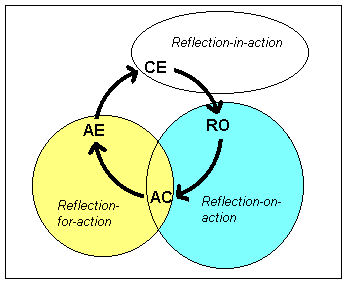Reflection-on-action
In this diagram, you can see a clear relationship between reflection-in-action, reflection-on-action and reflection-for-action. This figure is taken from Terry King's article 'Development of Student Skills in Reflective Writing' and has used Kolb's learning cycle to connect the different aspects of reflection.
In the introductory reflection module you were introduced to a similar single loop cycle that was based on Kolb's cycle (1984). This is one of many different learning cycles depicted in the literature.
Reflection-in-action is common practice for many professions, such as, teachers, musicians, architects and lawyers.
This ability to reflect on ongoing experience and learn from is a vital skill for all effective practioners (Schon 1983 cited in Boud 2001).
In this critical reflection module we include the reflection cycle to illustrate how your ability to reflect can be enhanced by developing this ability, as well as, reflection-on-action and reflection-for-action (see sections on critical reflection, reflection and ethical action and ethical decision making).
Reflection-on-action requires us to take time out to explore why we acted as we did. By doing this we arrive at questions and ideas about our activities and practice that we can draw upon in future decision making (Schon 1983 cited in Boud 2001).
In this module we also explore the benefits of going beyond a single loop of the reflective cycle by taking time to incorporate the perspectives of others.
Please note that Kolb's cycle is included as an illustrative aid to understanding the complex and often messy area of reflection. Concerns have been raised about the use of the model including:
- It is not necessary to follow this cycle to reflect
- Each stage is not equal in time
- It does not suit all forms of learning and is one basis of inquiry
- Reflection and experience are not in isolation from each other (RO is reflective observation - within reflection-on-action, experience is the CE (concrete experience from reflection-in-action)
- It may not suit all learners (gender, age, cultural background)
Next: Critical reflection
